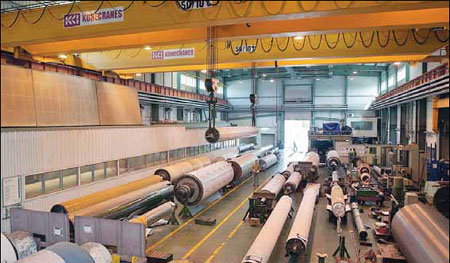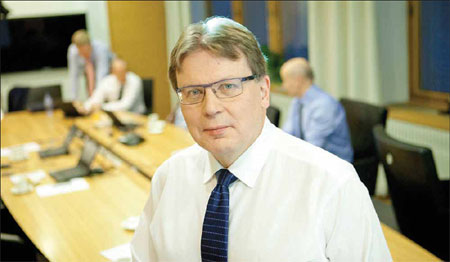Metso banks on service in China
Updated: 2012-06-08 12:37
By Shi Jing (China Daily)
|
|||||||||||
|
Above: Matti Kahkonen, president and CEO of Metso Corp, says demand for paper machines in China will increase, boosted by growth in paper usage. Below: Metso's service center in Wuxi, Jiangsu province. Photos Provided to China Daily |

Finnish company expects on robust demand for paper products to shore up revenues
Metso, the Finland-based producer of paper machines and rock crushers, is eyeing double-digit growth in China as it anticipates demand for its products growing exponentially in line with the nation's economic growth.
"Overall, we perceive excellent growth opportunities across all our business lines in China not only this year, but also going forward," says Matti Kahkonen, president and CEO of Metso Corp.
"Though our investment in China would continue to remain at the existing levels, we are confident of posting double-digit growth here. There will also be additions to our headcount as the business volumes increase," he says.
The Finnish company has already set up a technology center in the Shanghai Wai Gaoqiao Free Trade Zone to complement its various businesses in China. Set up with an investment of 500 million yuan ($78.5 million, 63.6 million euros) and spread across 29,000 square meters, the technology center is also one of Metso's largest investments in China to date. Headcount at the center is expected to reach 650 by the end of next year from the 400-plus currently.
Kahkonen says China is already one of the fastest growing markets for Metso. The group has more than 32,000 employees worldwide and a wide network of manufacturing, sales and service outlets. The China operations accounted for 777 million euros of its total global revenue of 6.65 billion euros last year.
That the group is well spread out in China is more than evident in the seven fully owned factories, three service centers, three joint ventures with local partners and the 15 legal entities under its umbrella.
But it is the paper and pulp industry, the second largest business of the Metso Group that accounts for more than 21 percent of the total revenue that has been its China mainstay.
"China has been the only place in the world over the past 10 years where new paper and pulp investments and capacities are being built. Ten years ago, China had only 30 to 40 million tons of installed capacity. Now it is over 100 million tons of installed capacity and growing," Kahkonen says.
But financing issues of the paper and pulp customers have somewhat slowed demand in the last few months, he says.
"China is still one of the most important markets for us as more than 40 percent of the paper and pulp in the Chinese market is produced using Metso machines. Of the more than 3,000 employees we have in China, nearly 2,000 are employed in the paper and pulp business."
Kahkonen says that the company's growth optimism also stems from the huge demand projections for paper usage in China.
"According to our estimates, the annual paper usage by each person in China is slated to reach 100 kilograms by 2015 from the present 75 kg," Kahkonen says.
"Though the numbers are still a far cry from the individual usage numbers of 250 to 300 kg every year in developed countries, we are confident that it would go up in the long run. The 100 kg figure is only a conservative estimate, as we have not taken into account the paper usage for daily needs and for printing. There is also the demand from the packaging industry that we have not accounted for. Since many of the products made in China need to be exported with proper packaging, we also anticipate increased demand for our paperboard products," he says.
According to China's 12th Five-Year Plan (2011-15) for the paper industry, the production volume of paper and board products in China is expected to reach 130 million tons by the end of 2015.
Metso has already started to capitalize on the huge demand by reorienting its China strategy and focusing more on the service businesses.
"Relying solely on the project businesses for growth is not feasible as fortunes often wax and wane. You may have lots of projects in one particular year and none in the other years."
The service business, Kahkonen says, offers prospects of steady and stable returns. "You know your customers, you know what is happening there and when the new projects come, you are close to your customers and ready to provide the services," he says.
According to Kahkonen, the Finnish company was hit badly in 2008 due to the global financial crisis. "Many of our production lines ceased operations, while some others had to operate at lower capacities. In contrast, during the same period our services business was more resilient and suffered dips of only 20 percent."
Kahkonen says that there were also some periods when the company virtually had no projects to execute. "Luckily for us most of our customers were paper mills, mines, construction sites, etc. So as long as they were producing something, there was always the need for our services," he says.
"The service business is a local business, that is, it is not something that you can do in a centralized or global way. You have to be close to your customers."
To some extent that is also the reason why Metso has three service centers and hundreds of service personnel and experts stationed throughout China. "We want to be closer to our customers as over 50 percent of our revenue in China comes from services," he says.
At the same time the added emphasis on services also brings with it manpower challenges. However, it is something that can be overcome if one has the right approach toward recruitment, Kahkonen says.
"One of the reasons why I have spent nearly 30 years with Metso is the opportunity that I have got to work in various capacities. I guess that is also the key element for Metso in China when it comes to recruitment. Rather our focus should be to ensure that there we can provide adequate growth opportunities for each and every employee," he says.
shijing@chinadaily.com.cn
(China Daily 06/08/2012 page20)
Today's Top News
Rescuers race against time for quake victims
Telecom workers restore links
Coal mine blast kills 18 in Jilin
Intl scholarship puts China on the map
More bird flu patients discharged
Gold loses sheen, but still a safe bet
US 'turns blind eye to human rights'
Telecom workers restore links
Hot Topics
Lunar probe , China growth forecasts, Emission rules get tougher, China seen through 'colored lens', International board,
Editor's Picks

|

|

|

|

|

|






